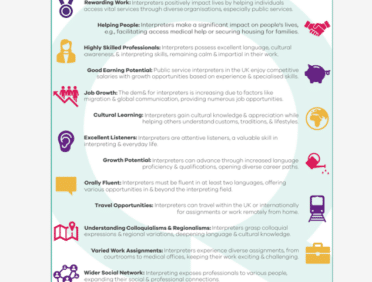Community interpreters are essential in providing efficient communication across language barriers in the United Kingdom’s diverse and ethnic setting. Their obligations go far beyond interpreting language from one to another and include ethical considerations, cultural sensitivity, and professional standards, especially in public services settings.
In this detailed study, we will look deeper into the multifaceted function of community interpreters in the United Kingdom, analysing their tasks, the rules of ethics they adhere to, and their significance in specialised situations.
Community Interpreting
In the United Kingdom, community interpreters are critical for breaking down language barriers and ensuring that people with limited English proficiency have access to crucial services, information, and justice. Their responsibilities include ethical standards, cultural knowledge, and professionalism. Interpreters play an important role in encouraging inclusivity and facilitating good cross-cultural interactions in a variety of situations, contributing to the safety and well-being of all members of society.
Interpreter Codes of Ethics
A community interpreter’s practise is founded on strict adherence to a well-defined code of ethics. These ethics serve as not just guiding principles but also as foundations for trust, professionalism, and effective communication.
One of the key foundations of interpreting ethics is confidentiality. Interpreters have access to sensitive material and are responsible for protecting the privacy of all persons participating in the session. Patients, for example, disclose their medical histories, diseases, and personal worries in healthcare settings. The interpreter must keep this information private and never reveal it to anyone else.
Furthermore, interpreters must maintain neutrality and impartiality. Interpreters should refrain from conveying personal ideas or judgements, regardless of the topic matter or emotional intensity of a discourse. Their purpose is to enable communication, not to influence the discussion’s content or direction. This impartiality ensures that the message is communicated accurately and without bias from outside sources.
Other ethical considerations for interpreters include honesty in their work, maintaining competency, professional development, avoiding conflicts of interest, and sticking to professional boundaries. These ethical norms not only maintain the integrity of the interpreting profession but also provide clients and service providers with confidence that the interpreting process is carried out with the utmost professionalism and honesty.
Facilitating Communication
At the heart of their duties, community interpreters serve as linguistic bridges, promoting communication between people who do not speak the same language. They allow for meaningful discussion in a variety of settings, including healthcare, local government, legal, education, social services, welfare and others.
For example, interpreters serve a critical role in ensuring that patients can properly communicate with healthcare professionals. They help with medical consultations, emergencies, and the dissemination of essential health information. Accurate communication in healthcare can be the difference between life and death, and interpreters play an important role in bridging language gaps in order to offer safe and excellent care.
Another example – in legal settings, translators are critical in ensuring that those with poor English ability have access to justice. They provide interpreting services during court proceedings, depositions, interviews, and legal consultations. Their role is to capture the tone, emotions, and nuances of court proceedings as well as convey words. This precision is required for due process and equitable legal representation.
In schools, community interpreters help non-English-speaking students, their parents, and educators communicate in educational settings. They aid in the transmission of curriculum, assessments, and student progress information, ensuring that language obstacles do not hamper a child’s educational journey.
Interpreters work in social services and government agencies to help people get access to various programmes such as welfare, immigration, and housing assistance. Their presence ensures that these services are available to everyone, regardless of language proficiency.
Confidentiality
Confidentiality is a critical component of ethical interpreting practise, in any setting individual privacy must be protected at all costs. Interpreters are steadfastly devoted to strict confidentiality agreements, assuring their commitment to these ideals at all times.
Consider the following scenario in a healthcare setting. Through an interpreter, a patient shares sensitive medical information with a doctor. The patient must have faith in the secrecy of this talk. If the interpreter violates this trust by releasing the material to unauthorised individuals, there could be substantial legal and ethical ramifications.
The interpreter is committed to maintaining confidentiality during the interpreting process. They are not permitted to discuss the content of interpreted conversations with anyone other than those involved in the interpreting process. This dedication is essential not only for respecting individual privacy but also for building confidence between clients and interpreters.
Cultural Understanding
While language proficiency is essential, cultural knowledge is also required of community interpreters. Language and culture are inextricably linked, and successful communication can be difficult, if not impossible, without an understanding of cultural nuances.
Cultural variables, for example, can have a substantial impact on patients’ beliefs, attitudes, and behaviours towards health and illness. A culturally competent interpreter can assist healthcare practitioners in providing more culturally sensitive care. As a result, patient compliance and overall health outcomes may improve.
Cultural awareness is equally important in safety-related situations. Different cultures may have different attitudes towards safety precautions, risk perception, and adherence to safety regulations or instructions. A culturally sensitive interpreter can help bridge these gaps and allow efficient communication regarding safety procedures and safeguards.
In addition, interpreters must deal with concerns of gender, age, and socioeconomic status. These characteristics can have an impact on how a message is received; therefore, interpreters must ensure that messages are communicated effectively and politely.
Accuracy and Clarity
Interpreters are language experts who are responsible for communicating messages accurately and clearly. Their responsibility is more than just literal translation; they must capture the intended meaning, subtleties, and emotions conveyed in the source language.
In healthcare, proper interpreting is critical for patient safety. A minor misunderstanding or miscommunication might have serious ramifications. Interpreters must transmit medical facts, treatment alternatives, and instructions precisely to ensure that patients fully appreciate the recommendations of their healthcare experts.
Similarly, clarity is essential in safety-related circumstances. Interpreters must ensure that their interpretations are crystal clear, whether they are relaying safety regulations in the workplace or offering advice in public settings. Accidents and injuries can occur when information is ambiguous or misinterpreted.
Interpreters must also cope with technical terminology and jargon, which is especially difficult in specialised disciplines such as medicine, welfare, law, and local government. To effectively transmit complex information, they must have a good mastery of these terms in both languages. Interpreters spend many hours researching specialist terms and compiling glossaries that they can call upon during assignments.
Professionalism
Community interpreters are known for their professionalism. They are expected to act professionally at all times, regardless of the venue or circumstances.
Interpreters in healthcare are frequently needed to dress appropriately for clinical environments. Their demeanour and look should reflect the importance of the healthcare environment. Patients rely on interpreters to be present and ready for visits; therefore, punctuality is critical.
Interpreters in any settings must be professional and dress and act appropriately. They are ambassadors for the service providers and often Language Service Providers (LSPs) (a.k.a Interpreting agencies) and must portray the right image. Even in highly intense situations, interpreters must maintain a calm and composed demeanour.
For example; interpreters working in educational settings. They are honorary members of the school community and should uphold the same values as teachers and staff members.
Maintaining professionalism promotes trust while also ensuring that the interpreting process proceeds easily and successfully.
Continuing Education
The field of community interpreting is ever-changing, with new terminologies and languages developing on a regular basis. To stay current on language skills, cultural understanding, and industry best practises, interpreters must engage in ongoing professional development.
Language learning is a continual process. Idioms, slang, and technical words are always changing. To give accurate and relevant interpretations, interpreters must keep up with these changes in all the languages in which they provide their services.
Continuous learning is also required for cultural competency. Understanding cultural sensitivities and preferences is an ongoing effort as cultures grow. To improve their effectiveness, interpreters should seek cross-cultural training and education.
It is also critical to stay up to date on changes in rules, policies, and best practises in numerous domains, such as healthcare and safety. To give the best service possible, interpreters must stay abreast of, and adapt to, new criteria and standards.
Specialised Settings
Community interpreters work in a variety of situations, each with its own set of issues and jargon. Some bof their most valued characteristics are their versatility and knowledge.
Interpreters are commonly seen in hospitals, clinics, and doctor’s offices. They enhance communication between service users and service providers, ensuring that service users receive the care they require and have a thorough understanding of their medical diagnoses and treatment plans.
Welfare interpreters are employed in job centres and local government. They allow people who speak limited English to understand proceedings, understand how to access services, and receive appropriate help.
In schools and colleges, educational interpreters assist students, parents, and educators. They aid in bridging language barriers in parent-teacher conferences, meetings, and special education settings.
Certification and Training
It is becoming increasingly difficult for community interpreters in the United Kingdom to find any work without certification and specialised training in order to improve their abilities and demonstrate their competence and credibility. Certification is a formal acknowledgement of an interpreter’s expertise and professionalism.
Interpreting is an occupation that places those who use it at a high risk. Imagine the impacts that incorrectly interpreted medical advice could have on a person’s health. Interpreters who have a qualification at Level 3 or above have proved that they are competent and therefore a low risk to those who use their services and this is becoming increasingly important to LSPs and service providers. More than that – it is immoral and reckless for anyone to practise interpreting without formal training and qualification in the same way that it would be for someone who has not passed a driving test to drive a vehicle on public roads.
The most common certification for interpreters in the UK, and the one which helps the majority of interpreters launch their careers, is the Level 3 Certificate in Community Interpreting. There are a number of places to achieve a Level 3 Certificate in Community Interpreting with the qualification provided by Learn Q being the most popular. Language proficiency, ethics, and interpreting skills are tested rigorously as part of the qualification, meaning LSPs and service providers can be assured that an interpreter who holds the Level 3 Certificate in Community Interpreting has a certain level of skills and knowledge and, crucially, are safe to practise .
Clients and service providers gain confidence in the interpreter’s abilities when they are qualified. It displays a dedication to preserving high professional standards and ethical beliefs and promotes a level of quality and safety.
Furthermore, depending on the industry in which an interpreter works, specialised training is frequently required. Medical interpreters, for example, may be trained in medical language, ethics, and patient confidentiality, whereas welfare interpreters will be trained in welfare procedures and vocabulary.
Key Takeaways: The Role of a UK Community Interpreter
Ethical Foundations: Community interpreters in the United Kingdom adhere to strong rules of ethics, which include confidentiality, impartiality, and professionalism.
Facilitation of Communication: Their primary purpose is to promote accurate communication between people who speak different languages, allowing for productive discourse in a variety of circumstances.
Privacy and Confidentiality: Interpreters are bound by tight confidentiality agreements, safeguarding the privacy of all parties involved in the communication.
Cultural Sensitivity: Interpreters must possess cultural understanding, as cultural factors significantly impact communication, particularly in healthcare and other community contexts.
Precision and Clarity: Interpreters are linguistic professionals who must express concepts precisely and clearly while also capturing nuances and emotions in their interpretations.
Professionalism: Maintaining professionalism is critical, which includes suitable dressing, timeliness, and courteous behaviour in a variety of settings.
Continual Professional Development: Community interpreters participate in continual professional development to stay current on language skills, cultural awareness, and industry best practises.
Diverse Settings: Interpreters adapt to specialised situations like hospital, welfare, educational, and local government contexts, providing linguistic assistance where it is most needed.
Accreditation and Training: To authenticate their skills, most interpreters need accreditation from professional organisations such as Learn Q, and qualifications such as the Level 3 Certificate in Community Interpreting.
Integral to Inclusivity: Community interpreters perform an important role in ensuring that those with language problems have fair access to crucial services, information, and assistance, contributing to a more inclusive and diverse society.
Learn Q Interpreter Training and Qualifications
If you would like to start a career in interpreting, Learn Q recommend the Level 3 Certificate in Community Interpreting. It teaches you everything you need to know about how to be an interpreter and is the entry level for getting paid interpreting work. If you choose one of our money saving bundles, it includes the course, exam and certificate.












